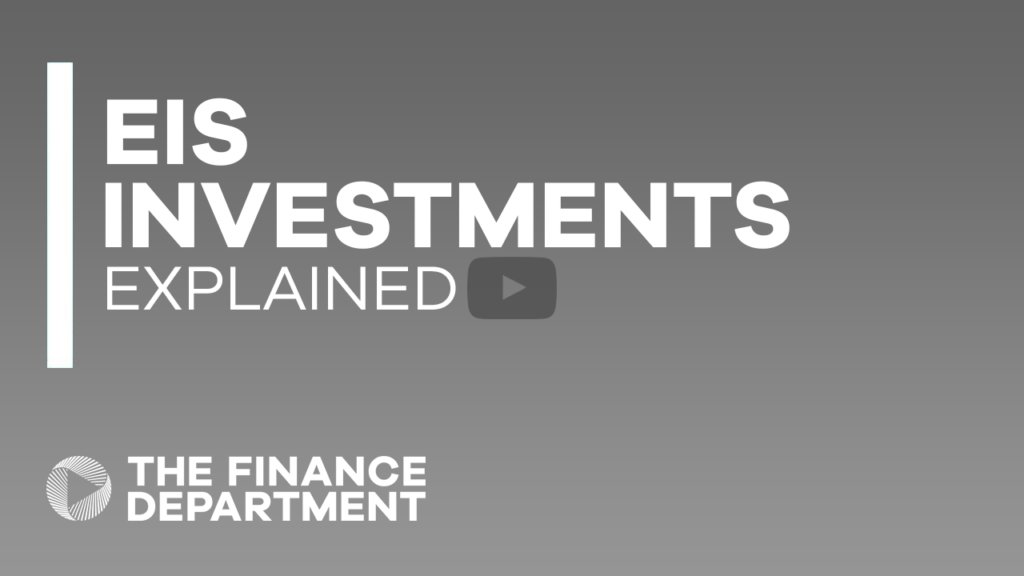What is EIS? (Enterprise Investment Scheme)
Join today and start learning
TFD is the learning platform built for finance professionals.
This content is available as part of our bitesized video series.
Watch this video today by joining our free community.
Join today and start learning
TFD is the learning platform built for finance professionals.
This content is available as part of our bitesized video series.
Watch this video today by joining our free community.
What is EIS? (Enterprise Investment Scheme)
Video information:
What is EIS?
EIS investments explained. The Enterprise Investment Scheme (EIS) is a UK government scheme that helps younger, higher-risk startups raise finance by offering UK investors generous tax incentives, or tax relief, including income tax relief, loss relief, exemption from capital gains tax (CGT) and exemption from inheritance tax. EIS investments were introduced in 1994 and have since become a well-established part of the UK tax landscape for UK investors. The EIS allowance has since grown to £2M (as long as £1M is placed into knowledge-intensive companies).
What is the Enterprise Investment Scheme?
The Enterprise Investment Scheme, known as EIS, bridges interested investors and young companies in need of finance to grow.
The scheme has promoted over £15 billion worth of private capital into more than 26,000 unquoted British companies. Investing into early-stage businesses is risky. 9/10 start-ups fail and these companies have little to no liquidity.
EIS lowers these associated risks by offering a number of incentives. Income tax relief of 30% of your investment, loss relief, should the company you’ve invested in fail. Inheritance tax exemption on shares held for a minimum of 2 years and exemption from capital gains tax.
Investment scenarios:
For the following examples we will imagine you are paying a tax rate of 45% and have invested £10,000.
Scenario 1:
The company fails. You receive £3,000 of income tax relief. You receive £3,150 of loss relief (the remaining £7,000 invested, multiplied by your tax rate). Your total loss is £3,850.
Scenario 2:
The company breaks even. You receive £3,000 of income tax relief. You can sell your shares for £10,000 at no loss (as shares sold are exempt from capital gains tax). Your total gain is £3,000.
Scenario 3:
The company doubles in value. You receive the £3,000 income tax relief. You can sell your shares for £20,000 (and will be exempt from capital gains tax on profit). You walk away with a cool £13,000 gain.
While the scheme allows for a much greater level of investment than many vehicles, there are some restrictions. There is a maximum investment limit of £1M per year, now been increased to £2M if £1M of the investment at least is placed into knowledge-intensive companies. Investors must hold their shares for at least 3 years.
Whilst there are a number of industries such as banking, insurance and farming that are denied access to EIS, here’s a taster of what an EIS-eligible company would look like:
Companies must have gross assets of less than £15M, be unquoted or on AIM or the ISDX Growth market and have fewer than 250 full-time-equivalent employees.
At the time of the share issue and for 3 years after the share issue, the company must: Conduct a qualifying trade, be independent (so not under the control of any other company) and have a permanent establishment in the UK.
We’re a venture capital fund that uses data and diversification to maximise return potential. To do this we created the Access EIS fund: a uniquely data-driven approach to investing in startups that co-invests with the business angels we’ve identified as the top performing in the UK. Further, the Access EIS fund builds a portfolio large enough to capture the annual growth in the UK startup market, and gain access to the best deals.
Video information:
What is EIS?
EIS investments explained. The Enterprise Investment Scheme (EIS) is a UK government scheme that helps younger, higher-risk startups raise finance by offering UK investors generous tax incentives, or tax relief, including income tax relief, loss relief, exemption from capital gains tax (CGT) and exemption from inheritance tax. EIS investments were introduced in 1994 and have since become a well-established part of the UK tax landscape for UK investors. The EIS allowance has since grown to £2M (as long as £1M is placed into knowledge-intensive companies).
What is the Enterprise Investment Scheme?
The Enterprise Investment Scheme, known as EIS, bridges interested investors and young companies in need of finance to grow.
The scheme has promoted over £15 billion worth of private capital into more than 26,000 unquoted British companies. Investing into early-stage businesses is risky. 9/10 start-ups fail and these companies have little to no liquidity.
EIS lowers these associated risks by offering a number of incentives. Income tax relief of 30% of your investment, loss relief, should the company you’ve invested in fail. Inheritance tax exemption on shares held for a minimum of 2 years and exemption from capital gains tax.
Investment scenarios:
For the following examples we will imagine you are paying a tax rate of 45% and have invested £10,000.
Scenario 1:
The company fails. You receive £3,000 of income tax relief. You receive £3,150 of loss relief (the remaining £7,000 invested, multiplied by your tax rate). Your total loss is £3,850.
Scenario 2:
The company breaks even. You receive £3,000 of income tax relief. You can sell your shares for £10,000 at no loss (as shares sold are exempt from capital gains tax). Your total gain is £3,000.
Scenario 3:
The company doubles in value. You receive the £3,000 income tax relief. You can sell your shares for £20,000 (and will be exempt from capital gains tax on profit). You walk away with a cool £13,000 gain.
While the scheme allows for a much greater level of investment than many vehicles, there are some restrictions. There is a maximum investment limit of £1M per year, now been increased to £2M if £1M of the investment at least is placed into knowledge-intensive companies. Investors must hold their shares for at least 3 years.
Whilst there are a number of industries such as banking, insurance and farming that are denied access to EIS, here’s a taster of what an EIS-eligible company would look like:
Companies must have gross assets of less than £15M, be unquoted or on AIM or the ISDX Growth market and have fewer than 250 full-time-equivalent employees.
At the time of the share issue and for 3 years after the share issue, the company must: Conduct a qualifying trade, be independent (so not under the control of any other company) and have a permanent establishment in the UK.
We’re a venture capital fund that uses data and diversification to maximise return potential. To do this we created the Access EIS fund: a uniquely data-driven approach to investing in startups that co-invests with the business angels we’ve identified as the top performing in the UK. Further, the Access EIS fund builds a portfolio large enough to capture the annual growth in the UK startup market, and gain access to the best deals.
Video information:
What is EIS?
EIS investments explained. The Enterprise Investment Scheme (EIS) is a UK government scheme that helps younger, higher-risk startups raise finance by offering UK investors generous tax incentives, or tax relief, including income tax relief, loss relief, exemption from capital gains tax (CGT) and exemption from inheritance tax. EIS investments were introduced in 1994 and have since become a well-established part of the UK tax landscape for UK investors. The EIS allowance has since grown to £2M (as long as £1M is placed into knowledge-intensive companies).
What is the Enterprise Investment Scheme?
The Enterprise Investment Scheme, known as EIS, bridges interested investors and young companies in need of finance to grow.
The scheme has promoted over £15 billion worth of private capital into more than 26,000 unquoted British companies. Investing into early-stage businesses is risky. 9/10 start-ups fail and these companies have little to no liquidity.
EIS lowers these associated risks by offering a number of incentives. Income tax relief of 30% of your investment, loss relief, should the company you’ve invested in fail. Inheritance tax exemption on shares held for a minimum of 2 years and exemption from capital gains tax.
Investment scenarios:
For the following examples we will imagine you are paying a tax rate of 45% and have invested £10,000.
Scenario 1:
The company fails. You receive £3,000 of income tax relief. You receive £3,150 of loss relief (the remaining £7,000 invested, multiplied by your tax rate). Your total loss is £3,850.
Scenario 2:
The company breaks even. You receive £3,000 of income tax relief. You can sell your shares for £10,000 at no loss (as shares sold are exempt from capital gains tax). Your total gain is £3,000.
Scenario 3:
The company doubles in value. You receive the £3,000 income tax relief. You can sell your shares for £20,000 (and will be exempt from capital gains tax on profit). You walk away with a cool £13,000 gain.
While the scheme allows for a much greater level of investment than many vehicles, there are some restrictions. There is a maximum investment limit of £1M per year, now been increased to £2M if £1M of the investment at least is placed into knowledge-intensive companies. Investors must hold their shares for at least 3 years.
Whilst there are a number of industries such as banking, insurance and farming that are denied access to EIS, here’s a taster of what an EIS-eligible company would look like:
Companies must have gross assets of less than £15M, be unquoted or on AIM or the ISDX Growth market and have fewer than 250 full-time-equivalent employees.
At the time of the share issue and for 3 years after the share issue, the company must: Conduct a qualifying trade, be independent (so not under the control of any other company) and have a permanent establishment in the UK.
We’re a venture capital fund that uses data and diversification to maximise return potential. To do this we created the Access EIS fund: a uniquely data-driven approach to investing in startups that co-invests with the business angels we’ve identified as the top performing in the UK. Further, the Access EIS fund builds a portfolio large enough to capture the annual growth in the UK startup market, and gain access to the best deals.








